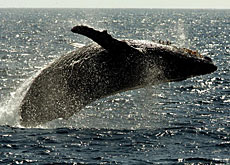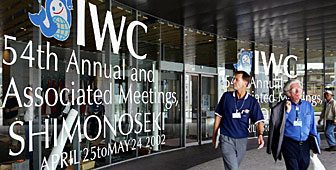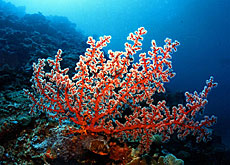Swiss prepare for “stormy” whaling meeting

A Swiss delegation is in the Caribbean island of St Kitts for what is expected to be a tempestuous annual meeting of the International Whaling Commission.
“Calm before the storm” is how delegation member Bruno Mainini describes the charged atmosphere in St Kitts, with pro-whalers poised to win majority control. The Swiss will be playing a mediation role between pro- and anti-whalers.
Against this backdrop, Switzerland will be calling for a continuation of protective measures for endangered whales.
It will also be urging “less hunting via greater controls”, seeking progress on such contentious issues as quotas and hunting methods, and ensuring that IWC decisions are taken on a strictly scientific basis.
After a decade of discussions on the current whale-hunting ban and on other disputed matters the commission remains at an impasse, but environmentalists now fear the tide is turning.
Defenders and supporters of whaling have spent recent days lobbying supportive countries to attend the meeting.
The pro-whaling nations of Japan, Norway and Iceland are expected to win control of the IWC for the first time since the 1970s.
“Everyone is almost certain that there will be a change in favour of the pro-whaling bloc,” Mainini told swissinfo. “But in the past we have had a few last-minute surprises due to voting rights decisions.”
If the pro-whalers do take control of the IWC, it is unlikely they will be able to push through a return to full-scale commercial whaling immediately, as a three-quarters majority is needed to overturn the ban. However, IWC whaling rules could be relaxed.
“It could result in important changes to the IWC,” said Mainini, “particularly to some of the issues it deals with, such as conservation work, whale-watching or matters about small cetaceans such as dolphins, which pro-whalers say are outside its remit.”
Middleman
Switzerland will be playing an important mediating role at the meeting.
“Everyone talks to the Swiss. We can negotiate with both sides,” said Mainini.
Switzerland’s position on whaling, which is based on decisions taken purely on a scientific basis, remains similar to that of previous years.
The Swiss will be defending measures to protect whales threatened with extinction and will also be hoping to see progress on the IWC’s “Revised Management Scheme”.
The mechanism is intended to be a comprehensive and globally accepted document establishing quotas and methods for all whaling fleets, making hunting sustainable, humane and policed.
Switzerland would only support limited commercial whaling in restricted geographical areas if it can be proved scientifically that capturing whales in their natural environment does not harm their long-term survival or their ecosystem.
The Swiss delegation will also be endorsing the creation of new whale sanctuaries, on condition that they are backed by countries neighbouring them and are based on scientific arguments.
It will also be pushing for more research into the harmful affects of the environment on whales and is ready to contribute to anti-pollution initiatives.
Losing appetite
While pro-whaling nations insist that a limited return to commercial whaling is possible and that stocks of some species are high enough, anti-whalers claim that their opponents are losing the argument and that demand for whale meat is actually falling back home.
In 2002 the Japanese newspaper Asahi Shimbun carried out a survey that found that only four per cent ate whale meat ‘sometimes’ and nine per cent ‘infrequently’. The vast majority – 86 per cent – said they had never eaten the meat or had stopped doing so when they were younger.
Japanese government officials are currently promoting whale meat as a healthy, low-fat alternative to meat and marketing it to schools, hospitals and family restaurants in a bid to boost consumption and reduce stockpiles.
“Attitudes towards whales are changing in pro-whaling countries, such as Japan, but it will take many years,” added Mainini.
swissinfo, Simon Bradley
Norway has a legal objection to the moratorium and has continued commercial hunting of common minke whales.
Japan and Iceland are allowed to catch whales for scientific reasons.
Both have increased the size of their annual hunts in recent years, with the 2006 catch likely to exceed 2,000, the largest take since the ban was introduced.
The International Whaling Commission was set up by the International Convention for the Regulation of Whaling on December 2, 1946 to promote and maintain whale fishery stocks.
Since the 1980s the IWC has become the primary mechanism for the protection of all species of whale.
In 1986 it adopted a five-year moratorium on commercial whaling, which is still in force.
However, the Convention grants special permits to allow whale killing for scientific purposes. Since 1986 Norway, Iceland and Japan have been issued with permits.
This year’s IWC annual meeting takes place on the Caribbean island of St Kitts from June 16-20, 2006.

In compliance with the JTI standards
More: SWI swissinfo.ch certified by the Journalism Trust Initiative



You can find an overview of ongoing debates with our journalists here. Please join us!
If you want to start a conversation about a topic raised in this article or want to report factual errors, email us at english@swissinfo.ch.